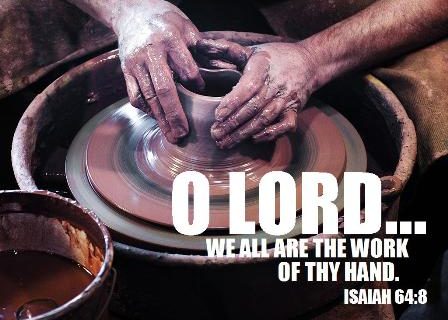There is a hymn that we sing that is titled, “Have Thine Own Way Lord”. It was written by Alelaide A. Pollard in 1902, which was inspired by a simple prayer of an elderly woman at a prayer meeting where she prayed: “It really doesn’t matter what you do with us, Lord — just have your way with our lives…” The first verse of the hymn states, “Have Thine own way, Lord, Have Thine own way; Thou art the Potter, I am the clay. Mould me and make me after Thy will, While I am waiting, Yielded and still.”
In Jeremiah 18:1-6 we find that the hymn “Have Thine Own Way Lord” encapsulates what the Lord told the prophet Jeremiah. For it states,
“The word which came to Jeremiah from the LORD, saying, Arise, and go down to the potter’s house, and there I will cause thee to hear my words. Then I went down to the potter’s house, and, behold, he wrought a work on the wheels. And the vessel that he made of clay was marred in the hand of the potter: so he made it again another vessel, as seemed good to the potter to make it. Then the word of the LORD came to me, saying, O house of Israel, cannot I do with you as this potter? saith the LORD. Behold, as the clay is in the potter’s hand, so are ye in mine hand, O house of Israel.”
From these verses we find that the potter had full control of the clay, however, the clay was not always in full submission to the hands of the potter. And as such, Jeremiah observed that the clay was “marred in the hand of the potter”. In other words the clay had not obeyed and performed at the hands of the potter in its shape and form, so the potter was going to begin a new work; but he would reuse the clay.
If you look at clay in its simplest form, it is a natural earthy dust for which water is added to. If you look at man, he was formed out of the dust of the earth, and then God breathed into man the breath of life and he became a living soul. (Genesis 2:7). But throughout the history of man we find that man has not always submitted to the hands of the potter (God), and as a result our lives have become shattered – as if we have returned back to our original state of “dust”. This is why it is imperative that we as human beings understand that God can take our shattered lives if we will but submit them to the “Potter”, and allow him to mould and make our lives after His will. First, the submission begins by believing that we are all sinners by nature and that our lives can be changed to a vessel of honor if we through repentance and faith trust in the redemptive work of Jesus Christ. But it must also be understood here that the “Potter” has not completed His work in our lives at the moment of salvation. He wants to continue to mould us and make us after His will – for which we must continue to voluntarily submit to.
Philippians 1:6 promises,
“Being confident of this very thing, that he which hath begun a good work in you will perform it until the day of Jesus Christ:”
Ephesians 2:10 states,
“For we are his workmanship, created in Christ Jesus unto good works, which God hath before ordained that we should walk in them.”
And Philippians 2:13 states,
“For it is God which worketh in you both to will and to do of his good pleasure.”
It was recently shared with me that clay used in its original form (that is, the dust and the water), can only produce a vessel of a certain size. This is due to limitations of the clay. However, a skilled potter can take fragments from a broken vessel and mix it in with new dust to create a stronger clay from which he can produce a larger and greater vessel. The potter, through his experience, must choose fragments that are not too large and not too small. Fragments too large will cut his hands while spinning the clay on the wheel. Fragments too small will not yield the strength he desires from the clay. But, when the new vessel is created and fired in the kiln, those broken fragments that were mixed in with the new clay not only provide strength, they provide a brilliance in color that could otherwise not have been captured. And thus it is with our lives. The Lord can take the brokenness of our lives and mix it with new dust – and create new honorable vessels – from which we can be of greater service unto Him. But again, we must see that the Lord is the “Great Potter” and our lives are the “clay” for which we must submit to. When we acknowledge this truth and voluntarily submit, we will then be able to pray, “Have thine own way Lord…Mould me and make me after Thy will, While I am waiting, Yielded and still.”



